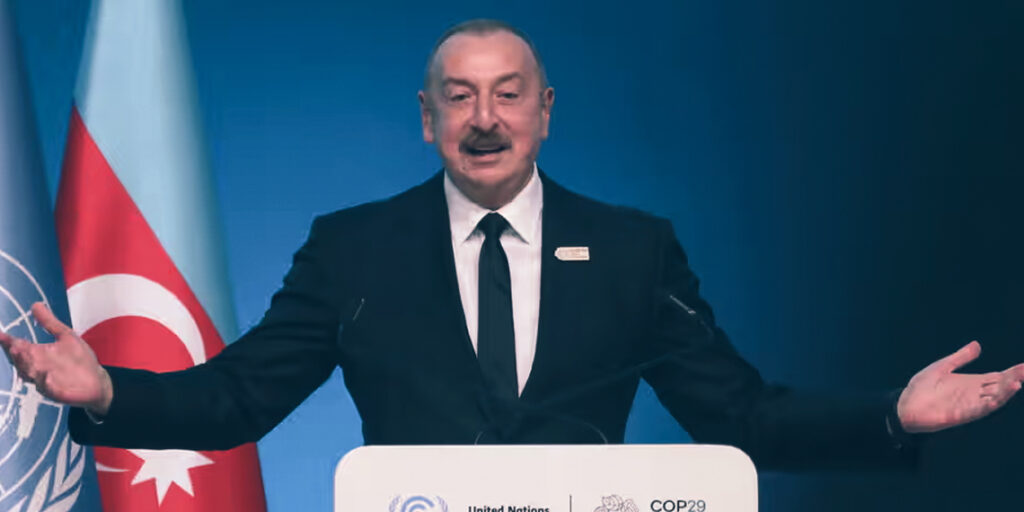Two senior UK peers, Lord Iain McNicol and Lord Darren Mott, once political rivals in managing opposing party campaigns, have come under scrutiny for their paid visits to Azerbaijan. In October, they traveled to Baku, the Azerbaijani capital, to lay a wreath at the grave of Heydar Aliyev, the former president of Azerbaijan. Their trip was funded by businessman Tahir Gözel, raising questions about the involvement of UK parliamentarians in promoting the image of Azerbaijan’s authoritarian regime.
Lord McNicol and Lord Mott are the latest UK peers identified by a joint investigation by The Guardian and the Organized Crime and Corruption Reporting Project (OCCRP) for accepting expenses-paid trips to Azerbaijan. While these trips were properly registered and within parliamentary rules, human rights groups warn that they risk legitimizing the government of President Ilham Aliyev, whose administration has faced accusations of ethnic cleansing, repression of political opposition, and persecution of journalists.
Azerbaijan’s Hosting of Cop29 Sparks Increased Support
Public endorsements by UK peers for Azerbaijan have risen ahead of the Cop29 climate summit, held in Baku. Several members of the House of Lords, including Lord David Evans, have also acted as election observers in the disputed Nagorno-Karabakh region, a territory seized by Azerbaijan during a military offensive in 2022. Some peers have compared Azerbaijan’s elections favorably to UK standards, despite independent monitors deeming them undemocratic. The UK government criticized the February 2024 presidential election in Azerbaijan, stating it took place in a restrictive environment with no genuine political alternatives.
Lord Evans, a Labour peer and publishing entrepreneur, has longstanding ties with Azerbaijan. His company, Senate Publishing, has received contracts from Azerbaijan’s state-owned oil company Socar to produce books promoting the nation. He also hosted events in the House of Lords celebrating Azerbaijan’s achievements, including its controversial 2020 war with Armenia. At one event, Evans read a self-composed poem praising Azerbaijan’s reclaiming of Nagorno-Karabakh, saying, “Thank God we got it back.”
Election Monitoring Raises Ethical Concerns
Lord Evans has traveled to Azerbaijan four times to observe elections and a referendum, all funded by the Azerbaijani government. Reports in state media quoted Evans praising the fairness of these elections. However, independent monitors, including the European Platform for Democratic Elections (EPDE), criticized Evans for misrepresenting the electoral process to benefit Azerbaijan’s regime. The EPDE called the elections heavily flawed and accused peers of legitimizing authoritarian practices by participating as observers funded by the regime.
Liberal Democrat peer Lord Qurban Hussain also observed elections in Nagorno-Karabakh in 2023. Hussain, whose expenses were covered by Azerbaijan’s parliament, compared the elections to those in the UK, despite widespread criticism from independent watchdogs. The EPDE’s electoral integrity head, Lukasz Kondraciuk, stated that election monitoring lacks credibility if funded by the host regime, calling such actions a tool to legitimize authoritarian governments.
Business and Political Ties Under Scrutiny
Lord Evans has faced further criticism for his connections to Socar. His younger son interned at the company’s Geneva office in 2023, sparking allegations of potential conflicts of interest. Socar confirmed the internship complied with Swiss labor laws and was vetted for conflicts by its compliance team. Evans defended his family’s ties, stating his son paid his own expenses for accommodation and travel.
Evans has hosted multiple events in the House of Lords promoting Azerbaijan’s business interests, including a 2017 dinner for 60 guests and a 2023 breakfast reception on the House of Lords terrace. These events featured high-profile attendees such as Azerbaijan’s ambassador to the UK and senior UK officials. Evans emphasized that his company’s publications for Socar were conducted on a “normal commercial basis,” dismissing allegations of undue influence.
Human Rights and Free Speech Concerns
Azerbaijan’s human rights record has drawn significant criticism. Human Rights Watch described the nation’s inaugural European Games in Baku as being held during the “worst crackdown” in its post-Soviet history, with activists and journalists silenced. Despite this, UK peers have continued to support Azerbaijan publicly, furthering concerns about the ethical implications of their endorsements.
Azerbaijan’s embassy in London defended the trips, stating that they allow parliamentarians to see the situation firsthand. However, critics argue that these visits and public endorsements lend undue credibility to a regime accused of systemic oppression and electoral manipulation.
The Role of Cop29 in Promoting Azerbaijan
Tahir Gözel, the businessman who funded Lord McNicol and Lord Mott’s recent trip, emphasized the importance of Azerbaijan’s hosting of the Cop29 summit. Gözel’s non-profit, the Tahir Gözel Initiative for Development (TGID), aims to promote climate resilience while showcasing Azerbaijan’s role on the global stage. TGID invited UK parliamentarians to engage with Azerbaijani youth and support climate initiatives. Critics argue, however, that such efforts are part of a larger strategy to whitewash Azerbaijan’s authoritarian image.


